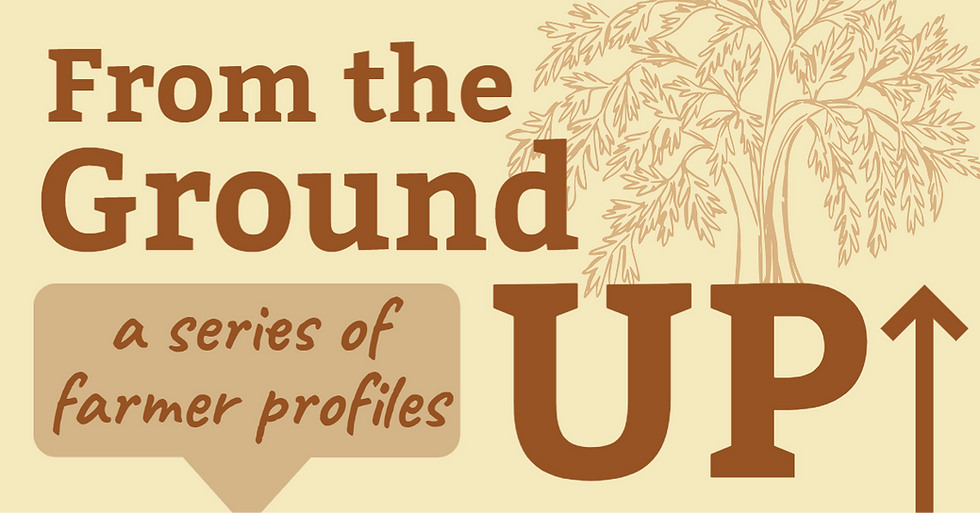From the Ground Up: A Profile on Coastal Roots Farm
- Climate Science Alliance

- Apr 2, 2020
- 4 min read
For our next profile in the "From the Ground Up" series, we talk with Ricardo Lopez, Vegetable Production Coordinator at Coastal Roots Farm in Encinitas, California. Check out our Q&A on the blog today!

As part of the on-going efforts of the 2020 Climate Change Consortium, hosted in partnership by the Climate Science Alliance and the California Department of Food and Agriculture, we are excited to share a series of producer stories, called “From the Ground Up: Farmer Profiles,” highlighting our region’s producers and the important work they do for our communities.
Today’s farmer profile is with Ricardo Lopez, Vegetable Production Coordinator for Coastal Roots Farm. Located in Encinitas, California, this community-based farm specializes in organic vegetable production and hands-on education.

Climate Science Alliance (Alliance): Why do you farm?
Ricardo Lopez (Lopez): Farming is honest and humbling work -- what you put in, you get out. The lifestyle of farming is also very important for us -- it is seasonal, keeping us connected to our environment, and allows us to be outside and healthy. It’s also community-based -- it is fulfilling to connect with and provide for our local community.
Alliance: Describe the farm.
Lopez: Coastal Roots Farm is a small community and education farm located on 17 acres of historic property in Encinitas, California. The farm includes vegetable production fields, a food forest, chickens, composting, and an educational garden/farm. We grow organic vegetables on 2 acres of the land using sustainable practices rooted in ancient Jewish wisdom. We are also an education center, hosting a variety of hands-on community and youth engagement events, programs, and volunteer opportunities.
Alliance: What do you love about the farm?
Lopez: I love the rich history of the farm, formerly the home of Paul Ecke Ranch Poinsettia, and that it has been intentionally preserved as agricultural land for many years.
I feel proud of how we treat and work with the land here. Our goal is to be a good steward -- everything on the farm is organic and we use sustainable practices to manage the land. I see the farm as an oasis in a metropolitan area that provides an important service for people. I think the community aspect is also very important, bringing together people in a tight knit community.

Alliance: Are you concerned about climate change? If so, what do you think climate change could mean for what you do?
Lopez: Yes -- I think we all need to chip in when it comes to climate change. As a farmer, I feel like I am part of the solution.
Irregular and variable weather makes it hard to plan, specifically for the crops we plant. These changes also have many trickle down effects for labor, working conditions and water availability. In general, I see climate change posing many challenges for farming, and primarily for our production. Water is a limiting factor and will continue as a stressor on our production.

Alliance: Do you use any practices on the farm to address the impacts of climate change?
Lopez: We are trying to diversify how we do agriculture, so that it is both profitable and good for the land. We use many practices to help us in doing so.
For irrigation, we not only use drip irrigation but also really closely monitor our water use down to the gallon so that we can be careful and thoughtful about how much we are using.
We really emphasize the diversity of our crops, growing multiple different crops throughout all seasons. This helps with habitat whereas monoculture systems can create imbalances. When it was all poinsettias on the property, there was probably less wildlife and a reliance on more chemical based solutions and pesticides due to monocropping. Through our on-site composting systems, we are able to divert waste while also building the health of our soils and crops. There are many other practices we implement for soil health and increasing organic matter, such as minimal tillage, compost application, silvo-pasturing with our chickens, cover cropping, and crop rotation.
In using these practices, we do not have to rely on chemical inputs, and are able to produce a diversity of food and nutrition for the community. We’ve also saved on water, increased the health of our soils, and have seen benefit with wildlife habitat and opportunities which is important in an urban area.

Alliance: What advice do you have for other/new farmers about farming in this region?
Lopez: Understand what your limiting factors are, whether it be labor, water, space, etc. Identify what the biggest factors are that limit your production, as those are going to vulnerable points on your farm. Strategize your model, actions, and practices based on these limiting factors and vulnerabilities.

To learn more about Coastal Roots Farm, and information on their pay-what-you-can farmstand and community opportunities, visit www.coastalrootsfarm.org

Stay tuned in the coming months as we share these stories and for more information, visit:
2020 Climate Change Consortium for Specialty Crops Southern California - for additional project information and to access all materials, resources, and surveys.
From the Ground-Up: Farmer Profiles - to hear stories from other producers
Climate Science Alliance - to learn more about our work and other projects



